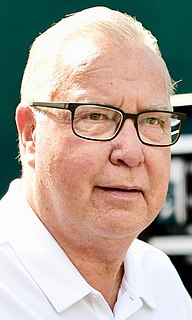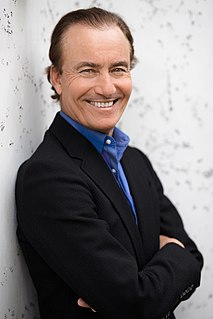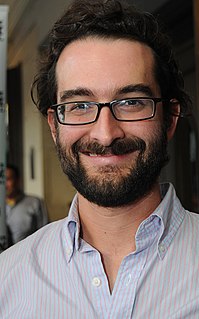A Quote by Lauren Conrad
It's hard to tell people who they should hang out with and who they shouldn't, especially if they aren't ready to hear that. You have to let your friends make their own mistakes sometimes. You can't protect them from everything, or else they'll never learn
Related Quotes
Someone once told me not to be afraid of being afraid, because, as she said, 'Anxiety is a glimpse of your own daring.' Isn't that great? It means that part of your agitation is just excitement about what you're getting ready to accomplish. Don't sell yourself short by being so afraid of failure that you don't dare to make any mistakes. Make your mistakes and learn from them. And remember: No matter how many mistakes you make, your mother always loves you!
You go out into the world, you read everything you can read, you imitate the things you love, and you learn how hard it is to do. Eventually, you learn your own vision of the world, you learn your own voice and how to hear it, and you learn to write your own work. Writers today have as many opportunities as my generation did, but they don't see the examples as clearly as we did.
I think my deepest criticism of the educational system . . . is that it's all based upon a distrust of the student. Don't trust him to follow his own leads; guide him; tell him what to do; tell him what he should think; tell him what he should learn. Consequently at the very age when he should be developing adult characteristics of choice and decision making, when he should be trusted on some of those things, trusted to make mistakes and to learn from those mistakes, he is, instead, regimented and shoved into a curriculum, whether it fits him or not.
Cram your head with characters and stories. Abuse your library privileges. Never stop looking at the world, and never stop reading to find out what sense other people have made of it. If people give you a hard time and tell you to get your nose out of a book, tell them you're working. Tell them it's research. Tell them to pipe down and leave you alone.
Be proud of your mistakes. Well, proud may not be exactly the right word, but respect them, treasure them, be kind to them, learn from them. And, more than that, and more important than that, make them. Make mistakes. Make great mistakes, make wonderful mistakes, make glorious mistakes. Better to make a hundred mistakes than to stare at a blank piece of paper too scared to do anything wrong.
You have to have the kind of personality where you're resilient and you can get up and keep moving and learn what there is. What I tell my employees is, 'I want you to make mistakes. If you're not making mistakes, you're not trying hard enough. But, when we make a mistake, let's all study it. Let's all learn from it. After that, we want to make different mistakes. We don't want to keep making the same mistakes.'
To be honest, I've always had far too much freedom. I had a job when I was 10. I started living on my own when I was 17 or 18. I've earned my own money; I've traveled the world. What would I rebel against? I've had so much freedom, sometimes it was hard. My parents wanted to protect me, but they had no idea how to. I had to learn as I went and make my own mistakes. I went from being totally unknown and never acting professionally to being in a major movie and being very famous. It all happened so quickly, I didn't have any time to work things out. It's been pretty scary at times.
Here's a memonic device that I feel teaches how we can properly cope with failure. Forget about your failures; don't dwell on past mistakes Anticipate failure; realize that we all make mistakes. Intensity in everything you do; never be a failure for lack of effort. Learn from your mistakes; don't repeat previous errors. Understand why you failed; diagnose your mistakes so as to not repeat them. Respond, don't react to errors; responding corrects mistakes while reacting magnifies them. Elevate your self-concept. It's OK to fail, everyone does; now how are you going to deal with the failure
I believe that our society's "mistake-phobia" is crippling, a problem that begins in most elementary schools, where we learn to learn what we are taught rather than to form our own goals and to figure out how to achieve them. We are fed with facts and tested and those who make the fewest mistakes are considered to be the smart ones, so we learn that it is embarrassing to not know and to make mistakes. Our education system spends virtually no time on how to learn from mistakes, yet this is critical to real learning.
Jazz is so difficult. A lot of people think once they've learned these licks they can get up and play them for the rest of their life. But that's not being truthful to the music 'cause it's not developing. Cats you hear that don't make no mistakes? They ain't trying to do nothing. everything they hear is on the mark, but they've played it so many times... I've built a whole career out of making mistakes!
There isn't going to be anyone to tell you what to do most of the time. It has to be your own decision and you have to learn to trust that, or learn that it's wrong. The hard truth is that there are people who believe they're writers and work hard at it and are sincere about it, but they don't make it. You have to be prepared for that possibility.
There's a point in everyone's career where they're not going to be playing as well as they should be. You just have to keep you confidence and not hang your head and realize that you're going to figure it out and that you're going to get better and that you're going to learn. Learn from all your mistakes.
... I don't think anybody should avoid mistakes. If it is within their nature to make certain mistakes, I think they should make them, make the mistakes and find out what the cost of the mistake is, rather than to constantly keep avoiding it, and never really knowing exactly what the experience of it is, what the cost of it is, you know, and all the other facets of the mistake. I don't think that mistakes are that bad. I think that they should try and not do destructive things, but I don't think that a mistake is that serious a thing that one should be told what to do to avoid it.







































